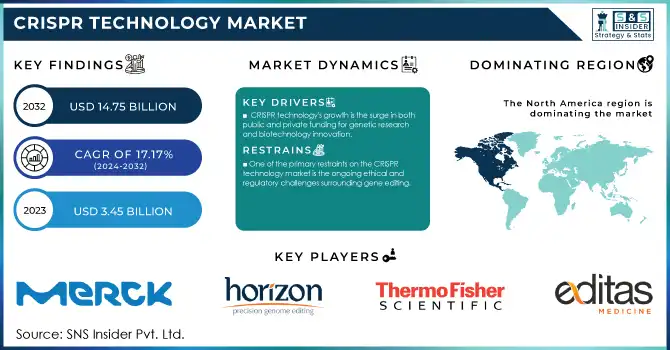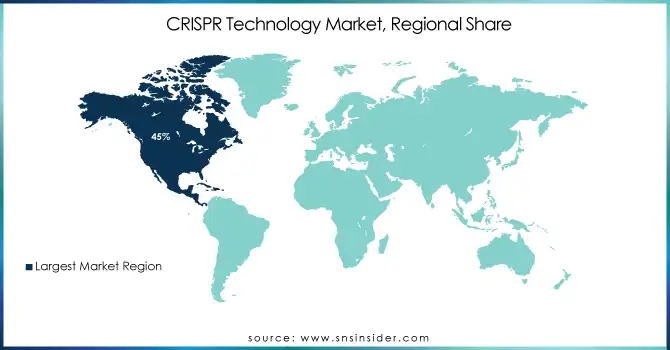CRISPR Technology Market Size Analysis:
The CRISPR Technology Market size was valued at USD 3.45 billion in 2023 and is expected to reach USD 14.75 billion by 2032 and grow at a CAGR of 17.17% over the forecast period 2024-2032.

To get more information on CRISPR Technology Market - Request Free Sample Report
The global CRISPR technology market is expanding at a substantial growth. Its transformative use in a wide variety of sectors, such as healthcare, agriculture, and industrial biotechnology, generated a growing demand in this market. The market is driven by advancements in genome editing technology, increased funding for genetic research projects, and increasing clinical trials associated with CRISPR-based methods.
In healthcare, CRISPR is revolutionizing the treatment of genetic disorders and rare diseases. In a 2023 update, CRISPR Therapeutics reported that approximately two-thirds of patients showed a positive response to treatment for large B-cell lymphomas, with 40% achieving complete remission. In late 2023, CRISPR Therapeutics applied for regulatory approval for the first CRISPR-based therapy — a CASGEVY therapy for sickle cell disease and transfusion-dependent beta-thalassemia. Similarly, in November 2024 Intellia Therapeutics published positive clinical data with the CRISPR-based therapy Nexiguran Ziclumeran, or Nex-Z, against Transthyretin Amyloidosis (ATTR). Such advances indicate that CRISPR applications in medicine are becoming increasingly successful and the use of such techniques is becoming more assured.
Outside of healthcare, CRISPR adoption in agriculture is ramping up, with the technology allowing for the creation of, for example, drought-resistant crops, plants that can fend off pests, and higher-yielding varieties. This has created demand from biotech companies and agricultural innovators, which further expanded CRISPR’s market base.
Advancements in technology, like AI-based guide RNA design and enhanced off-target identification, are refining precision and driving down costs, harnessing accessibility to CRISPR. As more governments and private players pump more funding and agreements for CRISPR and its market, the trajectory stays highly optimistic and optimistic, which means that CRISPR is "all set to alter the landscape in genetics science and other creation"
CRISPR Technology Market Dynamics
Drivers
-
One of the key drivers for the growth of the CRISPR technology market is the continuous improvement in the precision and accuracy of gene editing.
Early versions of CRISPR showed off-target effects, though improvements like the technologies CRISPR-Cas12 and CRISPR-Cas13 have limited this problem immensely. Improved designs for guide RNAs and increased resolution in tools make it more likely that better precision in achieving genetic modifications is less likely to result in more collateral damage, increasing confidence with applications of the CRISPR tool, most notably in therapies, such as gene therapy. It follows that CRISPR is fast becoming a realistic tool for treating a broader scope of genetic diseases, thus expediting its penetration into the health and pharmaceutical industries.
-
CRISPR technology's growth is the surge in both public and private funding for genetic research and biotechnology innovation.
Governments, universities, and venture capitalists are investing in CRISPR-related projects since they believe a lot of great potential exists for gene editing of complex diseases and higher agricultural productivity. Strategic alliances between biotechnology companies and pharmaceutical giants are also crucial. For example, CRISPR Therapeutics and Intellia Therapeutics have allied themselves with leading pharmaceutical firms to expedite the development of CRISPR-based therapies for genetic diseases. Such investments and partnerships have been offering the necessary resources for bringing CRISPR technologies from the laboratory to clinical application, furthering innovation and market expansion.
Restraint
-
One of the primary restraints on the CRISPR technology market is the ongoing ethical and regulatory challenges surrounding gene editing.
While CRISPR holds incredible promise for the treatment of genetic diseases, its application—especially in human germline editing raises the most important questions about ethics. Questions regarding "designer babies," unintended genetic alteration, and effects on future generations in the long term are propelling debates among ethicists, governments, and the public sphere. Regulatory bodies worldwide are still in the process of developing complete frameworks for CRISPR's clinical applications, which may further delay the development and approval of CRISPR-based therapies. These ethical and regulatory concerns create uncertainty and could slow the widespread adoption of CRISPR technology, particularly in sensitive areas like human genetic modification and clinical trials.
CRISPR Technology Market Segmentation Analysis
By Application
The drug discovery & development segment dominated the market with a market share of 55% in 2023, since it systematically evaluates the effects of gene modification on cellular phenotypes and guides the search for the most promising therapeutic options. In the early stages of drug development, screening through CRISPR optimizes lead compounds and identifies promising drug candidates.
The agriculture segment is expected to experience the fastest growth rate during the given forecast period. Since CRISPR helps to produce pest-resistant crops, this can grow with ease. Insect-repellent genetic introductions that increase crop resistance against frequent agricultural predators are probably going to pave the way for a less negative impact from agriculture and reduce the application of chemical pesticides.
By End-user
The pharmaceutical and biotechnology companies segment dominated the market and accounted for 65% of the market share in the CRISPR technology market in 2023. The demand for new, targeted therapies is huge, which mainly drives this market segment. CRISPR technology allows for precise gene editing, which may enable treatments tailored to each patient's condition for genetic disorders.
The academic & research institutes segment is expected to be the fastest growing during the forecast period. Researchers are using CRISPR to explore bacterial and viral infections, among others, such as infectious diseases. This involves developing gene-modified cellular and animal models for the study of host-pathogen interactions to identify potential targets for treatment.
Regional Insights
North America dominated the CRISPR market with a market share of 45% in 2023 and will continue to maintain its position over the forecast period. The reasons for growth in this region are a solid foundation of research, continuous technological advancements, excessive demand for precision medicine, favorable regulations, and a burgeoning biotechnology and healthcare industry. In addition, funding is rich, and the investment opportunities abound. However, the expensive cost of research and products regarding CRISPR can act as a deterrent to growth, especially among small research institutes that cannot afford it, and thereby hinder market growth.
The Asia-Pacific CRISPR technology market is expected to grow at the fastest CAGR between 2023 and 2032. Many countries in this region have initiated large-scale genetic research projects focused on exploiting the potential of CRISPR in precision medicine, and therapies, and understanding the genetic basis of many diseases. China is the largest market for CRISPR technology in the Asia-Pacific region, while India has the fastest growth.

Get Customized Report as per Your Business Requirement - Enquiry Now
CRISPR Technology Market Key Players
-
Thermo Fisher Scientific (TrueCut Cas9 Protein, GeneArt CRISPR Nuclease Kits)
-
Horizon Discovery (Edit-R CRISPR-Cas9 System, CRISPR Screening Libraries)
-
Merck KGaA (Alt-R CRISPR-Cas9 System, Synthego CRISPR RNA Kits)
-
Editas Medicine (EDIT-101 for LCA10 therapy, EDIT-301 for SCD and beta-thalassemia)
-
CRISPR Therapeutics (CTX001 for SCD and beta-thalassemia, CTX110 for CAR-T therapy)
-
Intellia Therapeutics (NTLA-2001 for ATTR amyloidosis, NTLA-2002 for hereditary angioedema)
-
Beam Therapeutics (BEAM-101 for SCD, BEAM-102 for beta-thalassemia)
-
Caribou Biosciences (CB-010 for non-Hodgkin's lymphoma, CB-011 for multiple myeloma)
-
Precision Biosciences (ARCUS Editing Platform, PBCAR0191 for NHL and ALL)
-
Synthego (Synthetic sgRNA, Engineered Cell Lines)
-
GenScript (CRISPR/Cas9 Nuclease mRNA, CRISPR Plasmids)
-
Cellecta (CRISPR Knockout Libraries, CRISPR sgRNA Lentiviral Pools)
-
ToolGen (CRISPR-Cas9 System, Genome Editing Services)
-
Mammoth Biosciences (CRISPR Cas14 System, CRISPR-Based Diagnostic Tools
-
Agilent Technologies (SureGuide CRISPR/Cas9 System, CRISPR RNA Synthesis Kits)
-
Origene Technologies (CRISPR/Cas9 Knockout Kits, Gene Knock-in Services)
-
Santa Cruz Biotechnology (CRISPR Plasmids, CRISPR/Cas9 sgRNA Lentiviral Particles)
-
Integrated DNA Technologies (Alt-R CRISPR-Cas9 System, CRISPR HDR Enhancer)
-
New England Biolabs (EnGen Spy Cas9 Nuclease, Cas9 Electroporation Enhancer)
-
Takara Bio (Guide-it CRISPR/Cas9 Systems, CRISPR Human iPSC Generation Kits)
Key Suppliers
These suppliers play a crucial role in providing the raw materials, reagents, and technical support necessary for CRISPR technology companies to develop and produce their products.
-
Integrated DNA Technologies Suppliers
-
New England Biolabs Suppliers
-
Thermo Fisher Scientific Suppliers
-
Sigma-Aldrich Suppliers
-
Synthego Corporation Suppliers
-
GenScript Biotech Corporation Suppliers
-
OriGene Technologies Suppliers
-
Agilent Technologies Suppliers
-
QIAGEN Suppliers
-
Eurofins Genomics Suppliers
Recent Developments in the CRISPR Technology Market
-
In November 2024, Intellia Therapeutics announced the first clinical evidence from its ongoing Phase 1 study demonstrating that Nexiguran Ziclumeran (Nex-Z), an in vivo CRISPR/Cas9-based gene-editing therapy, may positively influence disease progression in patients with Transthyretin (ATTR) Amyloidosis. This breakthrough highlights the potential of CRISPR technology in treating complex genetic disorders.
-
December 2023, CRISPR Therapeutics achieved a significant milestone with the approval of CASGEVY (exagamglogene autotemcel), the first CRISPR-based medicine designed to treat sickle cell disease and transfusion-dependent beta-thalassemia. This landmark development marks a pivotal moment in advancing gene-editing therapies for severe hematological conditions.
-
In May 2023, Thermo Fisher Scientific partnered with the University of California, San Francisco (UCSF) to launch a cutting-edge cell therapy facility at UCSF Medical Center’s Mission Bay campus. The new cGMP manufacturing facility aims to accelerate the development of advanced cell therapies for challenging conditions such as cancer, rare diseases, and other critical illnesses. This collaboration represents a significant step forward in delivering breakthrough therapies to patients.
| Report Attributes | Details |
|---|---|
| Market Size in 2023 | US$ 3.45 Billion |
| Market Size by 2032 | US$ 14.75 Billion |
| CAGR | CAGR of 17.17% From 2024 to 2032 |
| Base Year | 2023 |
| Forecast Period | 2024-2032 |
| Historical Data | 2020-2022 |
| Report Scope & Coverage | Market Size, Segments Analysis, Competitive Landscape, Regional Analysis, DROC & SWOT Analysis, Forecast Outlook |
| Key Segments | • By Products (CRISPR Enzymes and Kits, Other Products) • By Services (gRNA Synthesis and Cell Line Development, Screening and Validation, Other Services) • By Application (Drug Discovery and Development, Agriculture, Other Applications) • By End-User (Pharmaceutical and Biotechnology Companies, Academic and Research Institutes, Other End Users) |
| Regional Analysis/Coverage | North America (US, Canada, Mexico), Europe (Eastern Europe [Poland, Romania, Hungary, Turkey, Rest of Eastern Europe] Western Europe] Germany, France, UK, Italy, Spain, Netherlands, Switzerland, Austria, Rest of Western Europe]), Asia Pacific (China, India, Japan, South Korea, Vietnam, Singapore, Australia, Rest of Asia Pacific), Middle East & Africa (Middle East [UAE, Egypt, Saudi Arabia, Qatar, Rest of Middle East], Africa [Nigeria, South Africa, Rest of Africa], Latin America (Brazil, Argentina, Colombia, Rest of Latin America) |
| Company Profiles | Thermo Fisher Scientific, Horizon Discovery, Merck KGaA, Editas Medicine, CRISPR Therapeutics, Intellia Therapeutics, Beam Therapeutics, Caribou Biosciences, Precision Biosciences, Synthego, GenScript, Cellecta, ToolGen, Mammoth Biosciences, Agilent Technologies, Origene Technologies, Santa Cruz Biotechnology, Integrated DNA Technologies, New England Biolabs, Takara Bio, and other players. |
| Key Drivers | •One of the key drivers for the growth of the CRISPR technology market is the continuous improvement in the precision and accuracy of gene editing. •CRISPR technology's growth is the surge in both public and private funding for genetic research and biotechnology innovation. |
| Restraints | •One of the primary restraints on the CRISPR technology market is the ongoing ethical and regulatory challenges surrounding gene editing. |

